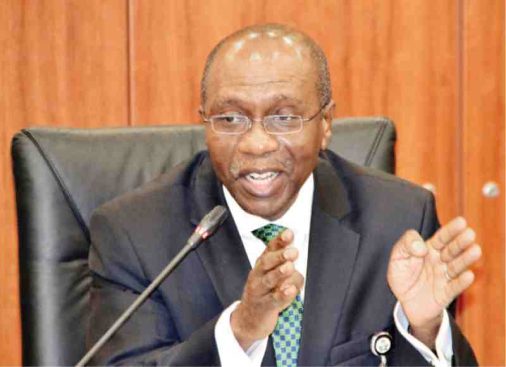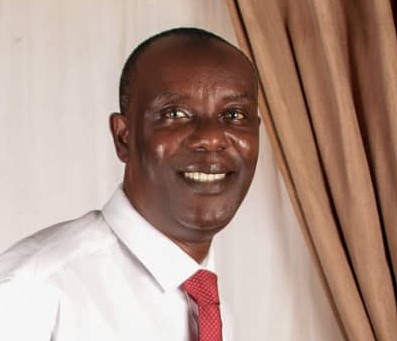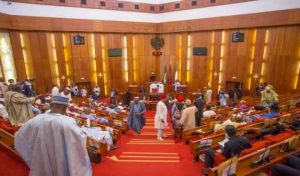“Our railway hole just keeps getting deeper”- Ataguba
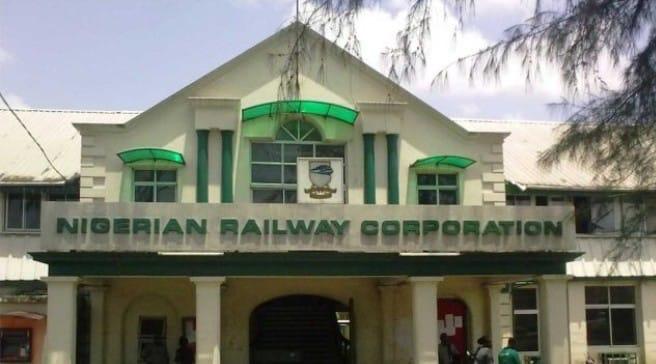
By Daniel Adaji
Rowland Ataguba, CEO of U.K. based railway project management specialists Bethlehem Rail Infrastructure Limited, has taken a swipe at the contractors involved in the Eastern and Central line railway projects describing a claim associated with them as disingenuous. He was responding to claims of the apparent imminence of loans from China for the railway projects attributed to undisclosed sources in a news report in one of the national dailies via his LinkedIn page. Ataguba, who is also a member of the NRC Unbundling Committee of the Federal Ministry of Transportation said, “The so called Chinese contractor source is simply being disingenuous. There is no loan forthcoming from China as far as we can see. That has been apparent since 2019. The Lagos – Calabar Coastal rail contract was signed in 2014. What manner of loan negotiations take this long and one that the borrower or guarantor is not aware of?” he queried.
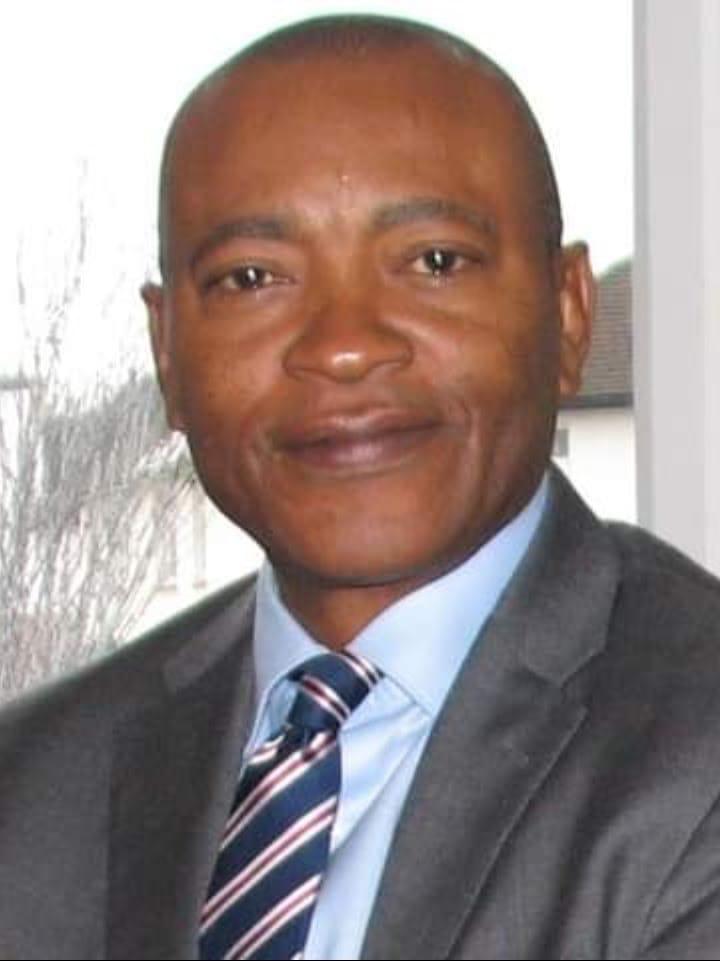
Rowland Ataguba, CEO Bethlehem Rail Infrastructure Limited, London
“How many loan negotiations are they facilitating for us by the way? Where are the loans they undertook to secure for Itakpe – Abuja Central line standard gauge railway and the Port Harcourt-Maiduguri narrow gauge railway Engineering Procurement Construction and Finance (EPC+F) contracts? Can they say hand on heart that they didn’t know that there were no railway loans available from China when they made those commitments in 2020 and 2021?” he further asked.
It is recalled in the report that the source which is believed to be from the contractor China Civil Engineering Construction Company (CCECC) had claimed that “the projects are in the stage of loan negotiation” and that,
“The loan approval is the issue. Once we can get the loan approval, we are ready to start the work. Coastal rail is also facing the same loan issue.
“For the purpose of economic revival and revolution, we have to complete the Lagos – Kano standard gauge which stops at Ibadan. Narrow gauge cannot support the economy to a large extent,” the source allegedly said.
The report in the national daily had stated that several railway projects worth over $21.3bn (about N16 trillion) across the country had stalled due to lack of funding, according to its findings. It went further to say that the development is threatening the federal government’s railway modernisation programme designed to connect all states of the federation. The projects include the Ibadan – Kano standard gauge railway ($5.3bn); $11.17bn Lagos-Calabar coastal railway project; $3.02bn rehabilitation project for the Eastern line (Port Harcourt – Maiduguri) and the $1.9bn Kano – Maradi railway project. All the projects are incorporated in the 25 – year railway roadmap unveiled during the administration of former President Olusegun Obasanjo.
The $11.17bn Lagos – Calabar coastal railway which had been allegedly in the pipeline for almost two decades was in 2021 approved by the Federal Executive Council (FEC) during the Muhammadu Buhari-led administration. It is recalled that the contract was initially signed in 2014 for $12bn odd by the Goodluck Jonathan government, but was revised by Buhari in 2016 to just over $11bn with construction to start before the end of 2018.
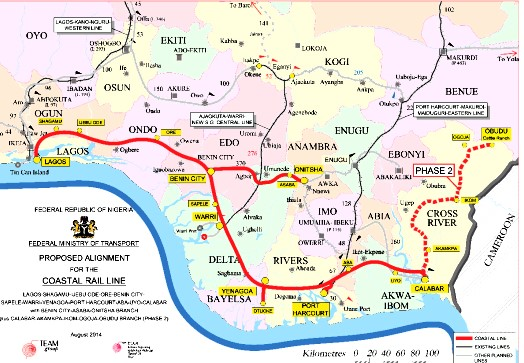
Lagos – Calabar Coastal Rail Line
While the project did not take off, the federal government at the same time flagged off the Lagos – Ibadan project which is for a distance of 157km. Along the line, the government also did the groundbreaking for the Kano – Katsina – Jibiya – Maradi and Kano – Dutse lines which are being funded by a consortium of European financial institutions. This was then followed by the ground-breaking for the reconstruction of the Eastern rail corridor, the Port Harcourt – Maiduguri rail, at the cost of $3.01bn.
Then Minister of Information, Alhaji Lai Mohammed, who spoke at the time on the Lagos-Calabar project signing, said the route was critical because, after the Lagos – Kano route, the Lagos – Calabar coastal route would link all coastal cities in Nigeria. A route alignment was also announced to run from Lagos to Shagamu, Shagamu to Ijebu-Ode, Ijebu-Ode to Ore, Ore to Benin City, Benin to Sapele, Sapele to Warri, Warri to Yenagoa, Yenagoa to Port Harcourt, Port Harcourt to Aba, Aba to Uyo, Uyo to Calabar, Calabar to Akamkpa to Ikom, to Obudu Ranch; with a branch line from Benin City to Asaba, Onitsha Bridge and then Port Harcourt to Onne Deep Seaport.
“This particular project is very important, especially for our coastal economy. The cost of the project is $11,174,769,721.74 and we have six years for the completion of this project,” Alh. Lai Mohammed said.
In February 2021, the former Minister of Transportation, Rotimi Amaechi, inaugurated the 284km Kano-Maradi rail line which construction was to be completed in 2023. The railway line links Katsina, Kano, Jigawa with Maradi, Niger Republic and in March 2021, the former president Muhammadu Buhari flagged off the rehabilitation and reconstruction of the old narrow gauge from Port Harcourt – Maiduguri Eastern railway line covering over 2,000 km including a deep sea port at Bonny and Industrial park among others awarded for $3.02bn.
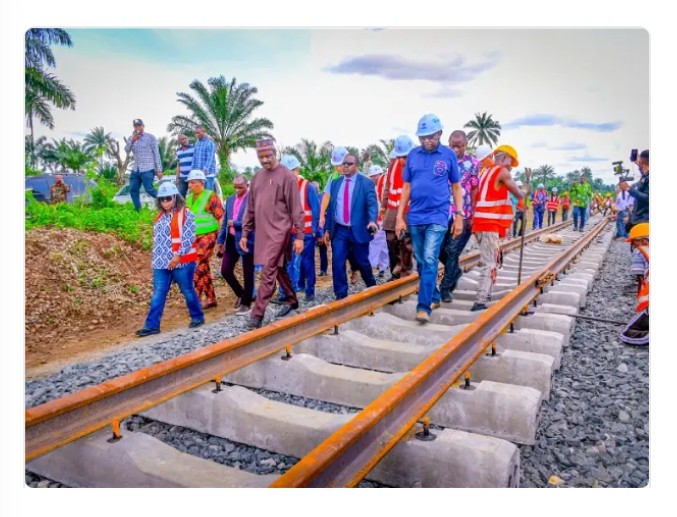
Hon. Minister for Transportation, Sen. Saidu Alkali on a visit to the Port Harcourt –Maiduguri Project
After securing a $1.5bn loan from China to complete the Lagos – Ibadan standard gauge which is Lot two of the Lagos – Kano standard gauge, China is said to be non-committal on providing the loan for the Ibadan – Kano Line. This was why the federal government again segmented the project starting with Kaduna – Kano standard gauge which is being funded internally.
As of September 2022, the federal government was said to owe China $4.09bn while China has not made a commitment on the loans for the coastal rail and Ibadan-Kano rail.
Mr Ataguba disapprovingly said, “Whomever signed some of these Agreements on our side must have known that they were acting in breach of the Public Procurement Act and that the penalty prescribed for such infractions is jail. Sadly we live in a country where our laws are observed in the breach hence these sorts of acts of impunity just carry on.”
“When the Coastal rail contract was signed in 2014, it did not have a no objection certificate from the BPP because it lacked a funding plan. These are prerequisites of the law but they signed the illegal contract anyway and there were no consequences.” He said.
“Ordinarily, the contract should have stipulated that without a no objection certificate, the contract was null and void but that provision was curiously absent. If you read the Lagos – Kano Western line SGR contract of 2006, the no objection clause was present. Why was it not included in the Coastal rail contract of 2014 which was more or less a facsimile of the 2006 contract? Your guess is as good as mine.” he added.
“The Central and Eastern line contracts did not have clear funding plans either as required by law and should never have been signed. Just vague promises that the contractor would secure a loan from a Chinese bank. Not only were the contracts signed by Nigerian officials but in the case of the Eastern line, our counterpart funding of 15% (about $400m) was released to the contractor whereas his 85% promised contribution to the project never materialised. So we handed to the contractor the yam and the knife metaphorically speaking and he claims he’s still negotiating loans like we were born yesterday. Meanwhile work has since stopped and the site abandoned to vandals due to lack of funds and insecurity. What manner of waste? That contractor should be explaining to the EFCC his part in the sham contract rather than telling tales by moonlight,” Ataguba charged.
The Central and Eastern line contracts did not have clear funding plans either as required by law and should never have been signed
He also flagged issues with the costs of the railway projects. Hear him, “The other concern is the contract sums. They seem quite high and appear to factor in too many absurd risks. I think the euphemism is called “padding” and these could be as high as 50% or more. Call it the long throat risk if you like. The contracts are mostly single sourced if not rigged, and it is hard to see how value for money can be achieved with such an approach. What should alarm is that these are contracts for billions of US$. Money we do not have and that generations to come will have to repay!!”
“In 2008, the same Chinese contractor faced with a President Yar’Adua and Transportation Minister Diezani Madueke threatening to cancel the Lagos – Kano standard gauge railway contract because they believed the cost at $3.2m/km was inflated and excessive, argued that it represented fair value. How could it then justify delivering Abuja – Kaduna standard gauge railway for $5.6m/km and Lagos – Ibadan standard gauge railway for an estimated $10m/km (because the final costs are not in yet)? And our officials could not connect the dots or were too complicit to care? These are staggering sums and even the $3.2m/km base rate could be said to be on the high side. The reality is that China may have been overcharging us and other African countries for railway infrastructure because of our poor and uncompetitive procurement culture/practices. But where are our officials who should be protecting our interests? Project costs analysis is not rocket science but we seem to have a conspiracy of silence.”
“The Lagos – Kano standard gauge railway contract in 2006 was a farcical contest between 2 sister companies, CRCC and CCECC. A sort of heads you win, tails I lose game. And Nigerian officials at the highest levels signed off such patent nonsense? And its been downhill since. In fact they have since given up any pretence of competition in procurement. ” He continued.
When the Coastal rail contract was signed in 2014, it did not have a no objection certificate from the BPP because it lacked a funding plan
“That China has been refusing to lend our government money for railway since 2018 is no surprise. Our debt service-to-revenue ratio has been climbing. For 2023 it stands at 73% according to the DMO. In 2022, the ratio was 80.6%, well above the World Bank’s suggested 22.5% for low-income countries like Nigeria. In May 2023, KPMG advised that the ratio may exceed 100% this year. So how does the FG propose to repay any further railway borrowings especially given that there have not been credible feasibility studies conducted for the projects and the selected procurement route is traditional with the NRC as the nominal operator? The same NRC that the world knows has never been able to recover its operating costs since 1964 talk less of capital expenditure, and has not been able to contribute meaningfully to the Abuja – Kaduna SGR debt repayment even when arm twisted by the FG?” he added.
“What is egregious however, is a situation where the Chinese are holding us to ransom with contracts which they are unwilling to fund. Ordinarily there should have been a proviso annulling the contracts if the associated loan was not secured but perhaps that would have exposed the breach of the PPA inherent. Is the Chinese contractor now expecting us to borrow from US or other Exim to then fund a Chinese contractor? Surely they must know that hell will freeze over first for that to happen.”
“So, to release us from such a bind, we may end up having to pay off the Chinese contractor for our “breach of his contract, loss of profit etc.” He knows that were a public official in China to have committed such a blunder, he would be lucky to escape the hangman’s noose. Sadly, this is Nigeria where the Minister gets the benefit of supposedly sound legal advice from his Director (legal) and also from the Attorney General’s office and then proceeds to sign a contract that manifestly exposes his country to legal jeopardy and gets away with it. What we have here appears similar to the PI&D scenario. Our officials have entered us into binding non performing agreements perhaps for personal benefit. We now need to unravel them so that we can procure alternative suppliers. These should ideally come at the cost of the liberty of the officials and their foreign collaborators as obtains elsewhere otherwise these selfish and unpatriotic behaviours will never stop.”He lamented.
“The reality is that there are alternative ways of delivering these projects and growing our railway network but we have been railroaded into a cul de sac because of the self-serving interests of some of our officials. Some of our indices are superb and support a sound business case for private investment. Huge land mass, huge population , rich natural resource endowment etc. Nigeria has no business being in the hole it is in with these projects. It is time we changed course and started to do things right. We don’t have time” he remarked.
The new Minister of Transportation, Senator Saidu Alkali, who is inheriting the various railway projects, has promised to ensure that the contracts are not stalled. He did not however disclose how the government would source funding for the projects.
Additional sources: Daily Trust
The Insight Report
Nigeria Coverage

